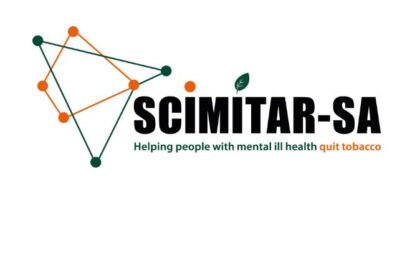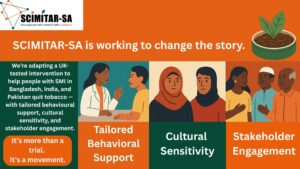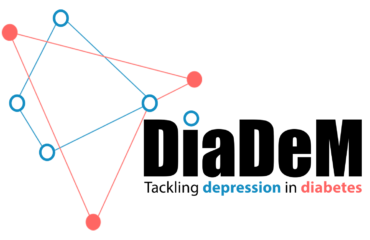
Mental disorders are a major contributor to the global disease burden, ranking among the top 10 causes of health loss. Individuals with Severe Mental Illness (SMI) (Schizophrenia, Schizoaffective disorder, Psychosis, Bipolar illness and Severe Depression with psychosis) are among the most vulnerable population groups facing health disparities, increased risk of physical multimorbidity, higher mortality, shorter life expectancy and poor lifestyle choices like smoking, poor diet, drug use, and inactivity.
Tobacco consumption is a leading modifiable cause of morbidity and mortality. Its use contributed to 8.71 million deaths and 229.77 million DALYs worldwide(2019). Smoking tobacco accounted for 7·69 million deaths and 200 million DALYs. An analysis from 127 countries reported that 348,798 deaths and 8,691,827 DALYs were lost from Smokeless Tobacco (SLT) use. Globally, the tobacco-attributable deaths are projected to rise to 8.3 million and double (3.4 million to 6.8 million) in Low and Middle-Income Countries (LMICs) by 2030. The combined economic cost of smoking (healthcare expenses and productivity losses) reached USD 1436 billion in 2012. Nearly 40% of this cost occurred in developing countries, underscoring the significant financial burden faced by these nations.
Two out of three individuals with severe mental health conditions are current smokers, significantly affecting their health. Reducing smoking among those with mental illness is considered the most impactful step in narrowing the life expectancy gap for this population. Bangladesh, India and Pakistan are LMICs that experience the highest global burden of diseases related to tobacco use, including both smoking and smokeless tobacco. Although studies from South Asia are limited, they report smoking prevalence as high as 50% among individuals with SMI, and widespread use of smokeless tobacco in the general population. Despite a decline in tobacco use within the general population over the past 40 years, there has been very little reduction in tobacco consumption among people with SMI.

A multi-country survey conducted in Bangladesh, India, and Pakistan among individuals with SMI attending mental health facilities reported higher tobacco use in people with SMI, particularly in men compared with rates reported for the general population in South Asia. However, despite this, only around 38.4% of tobacco users had received advice to quit tobacco.
The higher risk of tobacco dependence in individuals with SMI can be attributed to various factors, including genetic predispositions. For instance, research has shown that schizophrenia and smoking behaviour are linked to several common genetic regions. Additionally, socioeconomic status (SES) may play a role, as individuals with lower SES are more likely to experience psychotic disorders and have higher smoking rates compared to those with higher SES. A systematic review and meta analysis reported that tobacco use dependence/ nicotine dependence co-occurred in 33.4 – 65% of people with SMI. Individuals with SMI have high levels of nicotine dependence and heavier patterns of smoking.
Despite misconceptions to the contrary, there is evidence that people with SMI are interested in improving their physical health, including quitting tobacco. However, they need additional support compared with the general population to address barriers such as higher nicotine dependency levels, lower literacy levels and the need to titrate psychotropic medication whilst quitting. The UK-SCIMITAR trial has shown that SMI specific interventions are effective in enabling people with SMI to quit at six and 12 months (longer-term and sustained quitting. This intervention was cost-effective, reducing health utilisation and improving quality of life.
Tobacco cessation is crucial for individuals with SMI because it significantly improves their physical health, potentially adding years to their life expectancy. Tobacco cessation support within mental health services offers an opportunity to narrow the gap in life expectancy between SMI and the general population. However, differing patterns of tobacco use, socio-economic challenges, cultural beliefs and practices, health service provision, and regulatory approaches mean that evidence from HICs cannot be directly translated to LMICs. Interventions relevant to South Asian populations need to take into account the high prevalence of both smoking and smokeless tobacco use. The cultural perceptions around tobacco use in South Asia differ from Western countries and this issue has emerged as a key barrier in the community consultation panels. There are no clear guidelines to support cessation efforts for non-cigarette (eg. bidi) and smokeless forms of tobacco use. No large-scale trials of tobacco cessation have been conducted among people with SMI in LMICs or identified implementation strategies which could work best in these settings, thus informing practice and policy in this area.
The Smoking Cessation Intervention for Severe Mental Ill Health- South Asia (SCIMITAR-SA) programme focuses on including support for exclusive smokeless tobacco users (in addition to individuals who smoke, and those who use smokeless tobacco in conjunction with smoking products). Building on the expertise of the NIHR SCIMITAR and Global Health Group ASTRA programmes that have pioneered approaches in this area we are developing a tobacco cessation intervention tailored to people with SMI in South Asian LMICs. We now need to test feasibility and refine the proposed intervention before evaluating it in a full scale trial.
This pilot RCT will establish an evidence base for SCIMITAR-SA, laying the groundwork for a future definitive randomized trial for South Asian individuals with SMI who use tobacco. It will also refine the trial protocol before a full-scale, multi-country study, ensuring feasibility and scalability in real-world settings besides, identifying logistical and methodological challenges across diverse contexts. It will also identify key uncertainties allowing necessary adjustments to strengthen the full trial and optimum utilization of resources.



